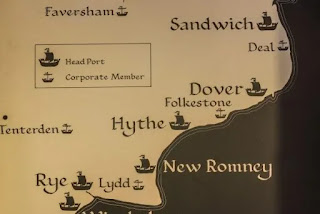That royal obligation was laid out in statistical terms: the five had an annual obligation to provide 57 ships for 15 days of service, if requested. The motivation for the obligation was never put on paper. A chief assumption is that they were necessary as part of the royal navy for military purposes. The evidence, however, suggests that those towns did not contribute proportionately more than any other towns to military efforts.
Because the privileges granted (chiefly of self-governance and the ability to salvage and keep the flotsam and jetsam of wrecked ships) started in the time of Edward the Confessor, one assumption is that he simply wanted to ensure the loyalty of a handful of ports that were essential to control traffic and trade to the continent.
Their importance gave them seats in Parliament. Representatives to Parliament were called Barons of the Cinque Ports. These days, the "Baron of the Cinque Ports" is purely honorary and used for those elected by the mayor to attend coronations. The barons had the right to hold the canopy over the monarch during the coronation, a practice which was last enjoyed in 1821 for George IV. For the coronation of Charles III, 14 barons represented the Cinque Ports (five original ports, two "ancient towns," seven "limbs") in the congregation.
In the centuries that followed their establishment, weather was a strong enemy causing their decline. Floods, especially in 1287 and 1362, changed coastlines radically, silting up harbors or washing towns away. Sandwich and New Romney are now each more than a mile from the coast. Hastings was washed away by the sea in the above-mentioned floods, and the remaining town was raided and burnt by the French during the Hundred Years Wars. Dover is still a major port, but the decline of the significance of the Cinque Ports was fairly total by the time of Elizabeth I. Major shipbuilding sites in Bristol and Liverpool stole some of their thunder as well.
Next time, I'm going to focus on one of the five towns: Sandwich. (And yes, I will mention that story.)

No comments:
Post a Comment
Note: Only a member of this blog may post a comment.